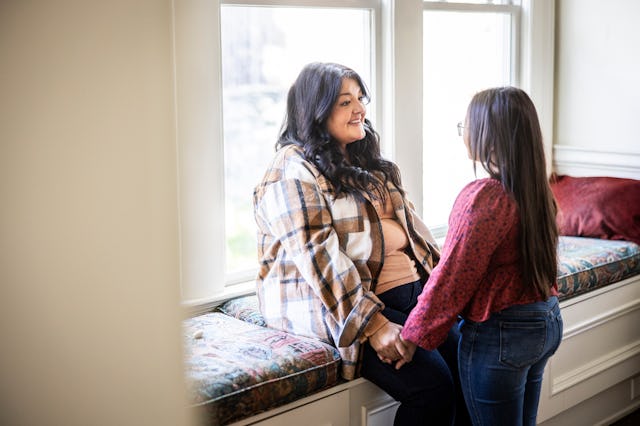Why It’s Healthy To Let Your Kid Air Out Their Feelings For You — Good And Bad
An expert says there are unexpected pros to letting your kid express their true feelings about you.

At some point along your parenting journey, you'll probably hear (or already have) the adorable words "You're the best mommy ever" come out of your child's mouth. It's a moment you'll never want to forget — especially as they grow up and (a) give you a real piece of their minds or (b) ghost you all together.
Call me an emotional masochist, but as hurtful as the truth can be, I'd still choose it over not knowing what my kids really think about me. And when I tapped parents around the country to ask their kids that very question, I wasn't surprised to find that, beneath some of the criticism, real feelings of love and respect shone through.
Before I share their heartwarming, harsh, and hilarious words, it's important to know that just wondering and being receptive to what's going on inside your kid's mind scores you major "good mom" points (not that there's any defined threshold). Plus, there are unexpected pros to letting your kid express their true feelings.
According to Abbey Sangmeister, therapist and parenting burnout coach, being OK with receiving criticism from our own kids opens up an excellent opportunity to create a space for honest and respectful communication while building a deeper relationship with them and yourself.
Sangmeister says that by mindfully creating time and space for communication, parents can choose a time when they feel calm to address the criticism or frustration they may be feeling and even put the conversation on hold if it escalates. This teaches healthy communication skills and leads to more productive conversations.
This criticism is also an opportunity to measure what your child may be lacking in their lives as well as to learn skills for synthesizing their words into feedback that can help you grow as a parent and an individual.
"Redefine what your child really needs. Parents often get caught up in thinking their kids need more stuff [...] when what kids really need is for us to be present. Children seek that attention and attachment. They may even be harsh to get a response or attention from us. When children are acting in that matter, take inventory of how you are taking care of yourself and whether you are showing up for your kid by being present with them," says Sangmeister, reminding parents that being present is much more about quality than it is about quantity.
And while there's no doubt that kids need more hands-on attention when they're younger, that doesn't mean older children and teens don't need quality time with their parents. Going for a walk together after dinner or asking about their day are simple ways to bond that can make all the difference in the parent-child relationship.
This quality time together also gives parents the chance to understand their child's daily experiences — which is often, but not always, correlated to the words coming out of their mouths. "Prioritize what is really important, create a list of what is negotiable and nonnegotiable, and give yourself permission to say no to the wants, activities, and events that create burnout and strain on you and your child," says Sangmeister.
At the end of the day, whatever words your child throws your way, or if they're ignoring you altogether, remember to try to take it as an opportunity to learn from each other, set boundaries, and strengthen your relationship.
Now that you might be a little more prepared to handle their feedback, sit back and enjoy knowing you're not the only one getting roasted (or loved on) by their own kids.
Here are a few heartfelt and sometimes hilarious examples from kids that parents shared:
- "You are weird, but who in our family isn't? You are good to people even when they don't deserve it." – Cecily B., 15
- "[You're] easily distracted but kind. Forgetful and helpful." – Julie N., 11
- "You always lighten the mood when I am sad." – Henry D., 9
- "Good. Kind of rude." – Bodhi K., 6
- "Sometimes you can be a bit demanding of other people. You're challenging; you challenge people to go out and do things." – Paul D., 12
- "I think you're really cool and nice, and you cook great spaghetti." – Martez R., 7
- "I think you're great [at] reading books and rumble farts." – Amelia T., 8
- "Have I ever told you you're like my favorite person ever? Just your whole energy is great." – Chastity W., 18
- "Patience, but not just for Lent. You should work on it until you're done." – Jenna A., 4 (on what mom needs to work on for Lent)
- "I love you, but sometimes you really stink." – Katie M., 7
So, remember — kids say a lot of things... some of them are even nice.